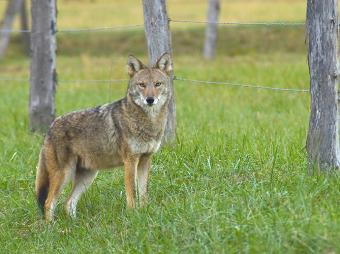
The Ontario island district on Lake Huron is struggling with depredation, according to an article in The Manitoulin Expositor. The author spoke with one landowner, who found some of her sheep dead one morning. The municipal wildlife compensation evaluator confirmed for the landowner that coyotes were the likely culprits.
This lead immediately to a call for a return of a bounty, or at the very least, an increase in trapping of coyotes, to “control the population.”
In the traditional way of thinking, this would be absolutely logical. But modern science has shown that model of predator control to be ineffective at preventing losses long-term, and there is now evidence that lethal control could increase livestock losses. There is also significant evidence showing that mesopredators like coyotes will increase their litter size and decrease territories when persecuted violently – meaning attempting to limit their local population results in larger populations. There are, however, solutions that can protect livestock, local predators, and entire ecosystems.
Chief among these solutions is Livestock Guardian Dogs (LGDs). Ancient lines of dogs (not the more common cattle or farm dogs) have been selectively bred and trained for hundreds of years to protect herds of livestock – and with great success.
Their unique personalities, which have low prey-drive but high protection instincts, as well as their size and conditioning, make them ideal shepherds when trained and implemented on farms.
In addition to LGDs, shepherds (or cowboy patrols), motion sensing lights, noisemakers, or sprinklers, and many other methods have proven highly effective at preventing livestock loss without resorting to lethal control.
We at The Fur-Bearers are offering assistance to landowners in Manitoulin – and anywhere that depredation is an issue – to connect them with resources that can help prevent livestock loss, and protect our wild neighbours.
Work like our growing Living With Wildlife campaign is only possible with the support of monthly donors. Please consider become a monthly donor – for as little as $5 a month – and help us create a Canada that is truly fur-free.

